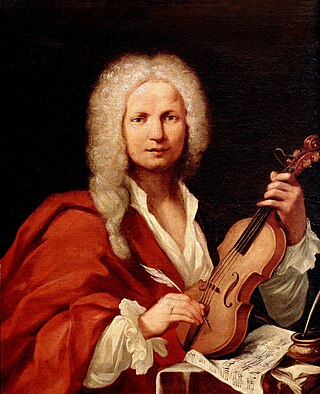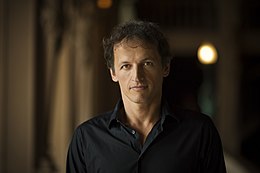
Orlando, usually known in modern times as Orlando furioso, is an opera in three acts by Antonio Vivaldi to an Italian libretto by Grazio Braccioli, based on Ludovico Ariosto's epic poem Orlando Furioso. The first performance of the opera was at the Teatro San Angelo, Venice, in November 1727. It is to be distinguished from an earlier Vivaldi opera of 1714, Orlando furioso, set to much the same libretto, once thought to be a revival of a 1713 opera by Giovanni Alberto Ristori but now considered by Vivaldian musicologists to be a fully-fledged opera by Vivaldi himself.

Jean-Pierre Ponnelle was a French opera director, set and costume designer.
Sandrine Piau is a French soprano. She is particularly renowned in Baroque music although also excels in Romantic and modernist art songs. She has the versatility to perform works from Vivaldi, Handel, Mozart to Schumann, Debussy, and Poulenc. In addition to an active career in concerts and operas, she is prolific in studio recordings, primarily with Harmonia Mundi, Naïve, and Alpha since 2018.

Roberto Abbado is an Italian opera and symphonic music conductor. Currently he is an Artistic Partner of The Saint Paul Chamber Orchestra. In 2015 he has been appointed music director of Palau de les Arts Reina Sofia in Valencia, Spain. From 2018 he's Music Director of the Festival Verdi in Parma. Previously he held the position of Chief Conductor of Münchner Rundfunkorchester.

Max Emanuel Cenčić is a Croatian countertenor. He was a member of the Vienna Boys' Choir.

Philippe Jaroussky is a French countertenor. He began his musical career with the violin, winning an award at the Versailles conservatory, and then took up the piano before turning to singing.
Lorenzo Regazzo, is an opera singer. His voice can be categorised as bass, bass-baritone or basso cantante. He is especially well known for interpreting Baroque, Classical, and bel canto repertoire. Among the qualities frequently noted by the critical press are his virtuosic coloratura technique, sumptuous tone, and vivid stage presence.

Marie-Nicole Lemieux, C.M., C.Q. is a Canadian contralto. In 2000, she became the first Canadian to win first prize at the Queen Elizabeth International Music Competition in Belgium.

Tieteberga is a partially lost dramma per musica by Antonio Vivaldi. The Italian libretto was by Antonio Maria Lucchini.
The Diapason d'Or is a recommendation of outstanding (mostly) classical music recordings given by reviewers of Diapason magazine in France, broadly equivalent to "Editor's Choice", "Disc of the Month" in the British Gramophone magazine.

Julia Mikhaylovna Lezhneva is a Russian soprano opera singer and recitalist, specializing in soprano and coloratura mezzo-soprano material of the 18th and early 19th century. She studied with Tamara Cherkasova, Irina Zhurina, Elena Obraztsova, Dennis O'Neill and Yvonne Kenny.
Ensemble Matheus is a French baroque orchestra. Based in Brittany, the ensemble gives concerts in a number of French cities, including Brest at Le Quartz, where it has enjoyed a residency since 1996, Vannes, and Plougonvelin. The ensemble receives funding from the Conseil Régional de Bretagne, Conseil Général du Finistère, the city of Brest, the Ministère de la Culture et de la Communication - Direction Régionale des Affaires Culturelles (DRAC) Bretagne, the Société Inter Parfums, and the Mécénat Musical Société Générale.
The International Classical Music Awards (ICMA) are music awards first awarded 6 April 2011. ICMA replace the Cannes Classical Awards formerly awarded at MIDEM. The jury consists of music critics of magazines Andante, Crescendo, Fono Forum, Gramofon, Kultura, Musica, Musik & Theater, Opera, Pizzicato, Rondo Classic, Scherzo, with radio stations MDR Kultur (Germany), Orpheus Radio 99.2FM (Russia), Radio 100,7 (Luxembourg), the International Music and Media Centre (IMZ) (Austria), website Resmusica.com (France) and radio Classic (Finland).
Mauricio Buraglia is a Colombian composer, recording-artist, musician-lutenist and theorbist of Italian descent, active in Paris, France.

La fida ninfa is an opera by Antonio Vivaldi to a libretto by Scipione Maffei. The opera was first performed for the opening of the Teatro Filarmonico in Verona on 6 January 1732. Among the arias is "Alma oppressa de sorte crudele".
Delphine Galou is a French contralto. Her vocal style allows her to perform the most virtuoso roles of the baroque repertoire.

The Victoires de la musique classique are an annual French classical music award event founded in 1986. The awards are the classical equivalent of the popular music awards Victoires de la Musique and the Victoires du Jazz. Most of the awards are for actual performers, orchestras, composers, etc. as opposed to the Diapason d'Or given to recordings, though there is an Enregistrement français de musique classique de l'année.
Gloria Banditelli is an Italian mezzo-soprano. She debuted in La Cenerentola in Spoleto in 1979. She is well known both for late-classical early-bel canto era roles of Rossini, Cimarosa and Paisiello, and also baroque opera, such as Monteverdi and Cavalli.

Laurence Dale is an English tenor, artistic director and conductor.
Svetlina Stoyanova is a Bulgarian operatic mezzo-soprano.











